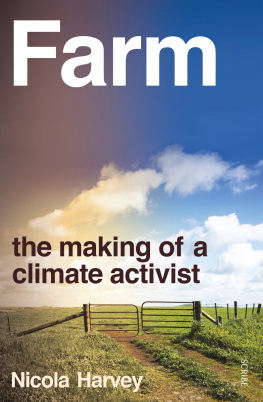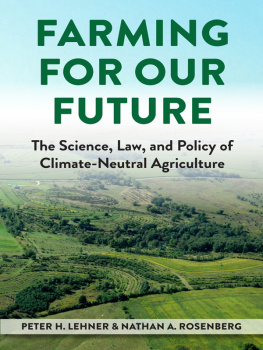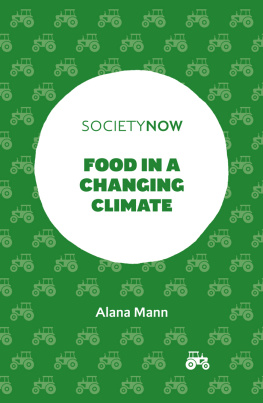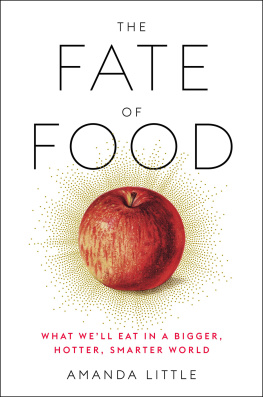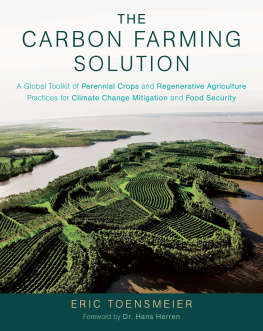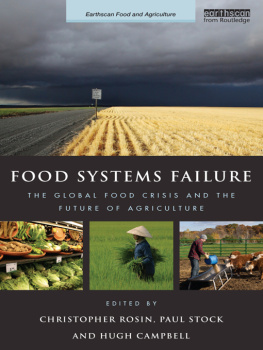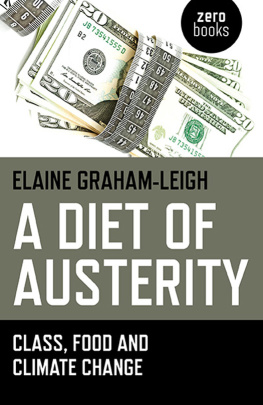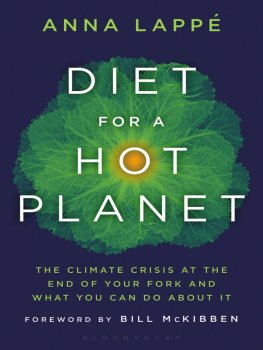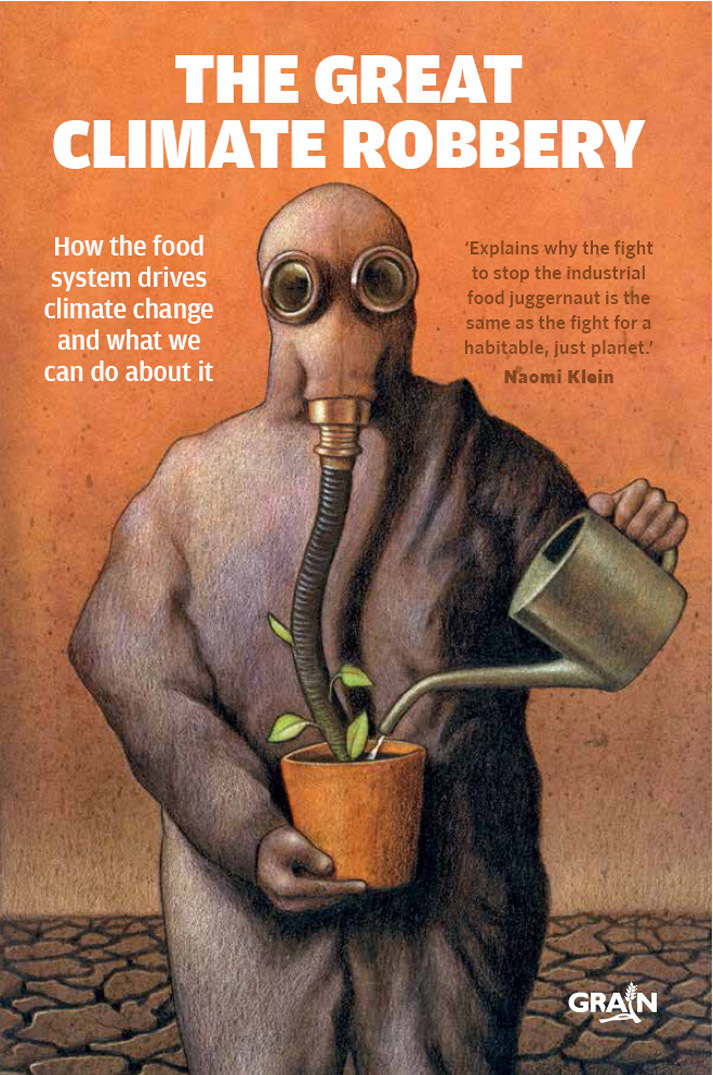THE GREAT CLIMATE ROBBERY
How the food system drives climate change and what we can do about it
This book is a must read for movements addressing climate change as well as seed and food Sovereignty. It shows that industrial corporate agriculture is a major part of the climate crisis, and small-scale ecological farming is a significant solution. It also alerts us to the false solutions being offered by those who created the problem the Exxons of agriculture.
Dr Vandana Shiva, author of Soil, Not Oil and Who Really Feeds the World
Food, land and seeds: protecting them is as essential to climate justice as rooftop solar, wind co-ops, or democratic public transit. This book lifts up the voices of indigenous and peasant farmers around the world, comprehensively explaining why their fight to stop the industrial food juggernaut is the same as the fight for a habitable, just planet.
Naomi Klein, author of This Changes Everything and The Shock Doctrine
Its about time that the role agriculture plays in the climate crisis and the role it could play in the solution got a concentrated dose of attention. This is fine work that will provoke much new activism!
Bill McKibben, author of Deep Economy
We welcome the efforts of our colleagues at GRAIN to put Via Campesinas proposals to cool the planet and fight false solutions at the center of the debate. The time has come to change the system, not the climate. Our farmers and indigenous peoples can cool the planet!
Edgardo Garca, International Co-ordinating Committee Via Campesina.
GRAIN takes on the key challenge of our time and lays the scaffoldings for the construction of a livable future. Climate crisis, toxic industrial agriculture and dirty energy: this publication shows the linkages as not being incidental but orchestrated by a warped system that must be straightened out.
Nnimmo Bassey, Director, Health of Mother Earth Foundation, author of To Cook a Continent: Destructive Extraction and the Climate Crisis in Africa
This book is the fruit of GRAINs long experience in the field. It is based on solid evidence and excellent analysis. The link between climate and agricultural activities is essential to contribute to a solution and GRAIN does not hesitate to denounce responsibilities and to indicate efficient ways for action.
Dr Franois Houtart, Professor, National Institute of Higher Studies (IAEN), Ecuador
This publication is an instrument of great analytical value providing an alternative for moving forward in the fight for sustainable human development and for the right to life on the planet.
Vctor Hugo Jijon,Commission for the Defense of Human Rights, Quito, Ecuador
This is a very timely book, particularly for readers in developing countries where elites may be actively promoting industrial agriculture or may be pressured to open their countries markets to it. The capital-driven industrial agriculture and food system is a totalizing enclosure of the commons that affects not only land, but almost every factor in food production, particularly seeds. This book is very valuable to all those who are concerned about the changes in the food system and its linkage to climate change. It captures and analyzes the critical forces and dynamics in the industrial agriculture and food system, as well as offering ways to change it.
Yan Hairong,Department of Applied Social Sciences, Hong Kong Polytechnic University, China

THE GREAT CLIMATE ROBBERY
Published in 2016 by
New Internationalist Publications Ltd
The Old Music Hall
106-108 Cowley Road
Oxford
OX4 1JE, UK
newint.org
he material in this book was created by GRAIN, which is a small international nonprofit organization that works to support small farmers and social movements in their struggles for community-controlled and biodiversity-based food systems. For more information, visit grain.org
Redistribution of the material presented in this work is encouraged provided that the original text is not altered, that the original source is properly and fully acknowledged and the objective of the redistribution is not commercial gain.
Cover picture by Pawel Kuczynski (pawelkuczynski.com)
Project Management: Firoze Manji
Copy editing: Andrea Meeson and New Internationalist
Design: Ral Fernndez and New Internationalist

British Library Cataloguing-in-Publication Data.
A catalogue record for this book is available from the British Library.
Library of Congress Cataloging-in-Publication Data
A catalog record for this book is available from the Library of Congress.
(ebook ISBN 978-1-78026-340-3)
Table of Contents
Guide
Contents
Governments tend to look at problems through a very narrow lens. In Paris, during the COP21 climate negotiations in December 2015, they said that agriculture is responsible for about 24 per cent of climate change. According to our data, they are missing the bigger picture: the broader food system is actually responsible for around half of all global greenhouse gas emissions, as you will read in this book. Not surprisingly, the solutions they propose to address the problem are also narrowly construed technofixes: from carbon markets and redesigned animal feeds to new genetically modified seeds and top-down forms of agro-ecology. By failing to take a broad systems view and by failing to address the deep political and social inequities underpinning the global food economy, this approach will only get us deeper into trouble.
As we realized on the road to Paris, and even more so during those two weeks of intense mobilization there, it has become ever more critical for people to take matters into their own hands. In addition to challenging the fossil-fuel industry, we need to attack the industrial food system if we want to have a real impact on climate change. This has already begun. In Paris, during the COP21, peasant and indigenous farmers from La Va Campesina led a symbolic direct action against Danone, one of the worlds biggest food and water companies. We took over the public space in front of their headquarters in Paris and painted a red line symbolizing the boundaries that cannot be crossed if we are to have a healthy and just food system Danone has already crossed these boundaries and needs to be held to account for this. We also held training sessions and workshops engaging thousands of people to talk about how the industrial food system is at the heart of climate change and how people-led food sovereignty, based on local markets and peasant agroecology, can turn all of this around.
This book is meant to support this movement and to help it grow. Over the past 25 years, GRAIN has worked with social movements and organizations around the world to defend local food systems and cultures from the advance of industrial agriculture. Part of our work has involved documenting the ill-effects of this industrial food system the growing hunger, the destruction of rural peoples livelihoods, the loss of biodiversity and cultures, the exploitation of labor and a range of health calamities and analyzing the ways through which this system expands, from seed laws to free trade agreements to secretive land deals.


